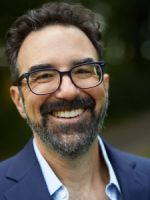Thomas Festa

Snowbound, Evening Light
We have been here before,
so it will occur to us
on the other side
when we reach out our fingertips like leaves
for the last light,
laughing,
we have never been.
(first published in Chronogram, May 2021)
Field Trip
Waves of stone rise ahead,
swells in an earthen ocean.
On the mountainside, early
morning, mid-October.
Mist rises from the valley
floor, the glint of river
scything through. The air
is thinner, it gets harder to
lie to yourself, on the ridge.
Slopes look gentler from afar
than up close, sheer crags
and scree, surge of shale
and graywacke sandstone, bedrock
lifted up and warped
in the Permian. These breakers, too,
someday will crash.
They image permanence
for now, like the group
shot we’ll snap at the peak.
Classmates you’d rather play
with won’t matter
in a dozen years, but they’re
as important as you think
for now. Dense geologic
folds—synclines, anticlines—
dot the horizon like
opposed fates you could choose.
To own your homing you
must listen, not to me
walking near, but to
the silent expanse beyond
that vanishing point. And so
we hike together, Son,
for this brief time, this being
all we have. For now
we breathe hard together,
remember, it is glorious.
(first published in Poetry Quarterly 44 (Winter 2020)
The Algebra of Origins
Algebra, Latin for computation;
surgical treatment of fractures;
derived from Arabic, al-jabr,
the restoration of anything missing, lost,
out of place, lacking;
the reunion of broken parts.
On the school playground,
my daughter broke the birdlike bones
of her left arm.
In a sudden downpour, a tree
falls out of common usage,
split low on the trunk.
The forest remembers dead languages,
the radius and ulna, forgotten paths.
She didn’t cry her whole time in Emergency.
Shock retold each new face the jagged tale,
how she broke her fall.
My little daughter’s bones
set in sleep and draped in fiberglass
begin to heal.
She discovers the aftermath below
the poplar that struck our deck,
dead swallows in a birdhouse on the ground.
As we flew down the highway
to the hospital where she was born,
her suffering stole all meaning from my words,
but on my face I could feel
the shadows of a vast flock
passing in silent unison overhead.
(first published in Lightwood, June 2020)
About the Author
Thomas Festa is a Professor of English at SUNY New Paltz, where he has taught since 2005. He is the author of a chapbook of poems, Earthen (forthcoming from Finishing Line Press), and a study of John Milton’s poetry, The End of Learning (Routledge, 2006). Individual poems of his have appeared in Bennington Review, Chronogram, Contemporary Haibun Online, Drifting Sands Haibun, Haiku Journal, Lightwood, Poetry Quarterly, and elsewhere. Other recent work includes two scholarly articles on W.S. Merwin and reviews of the latest collections by Jorie Graham and Robert Hass.
(click here to close this window)